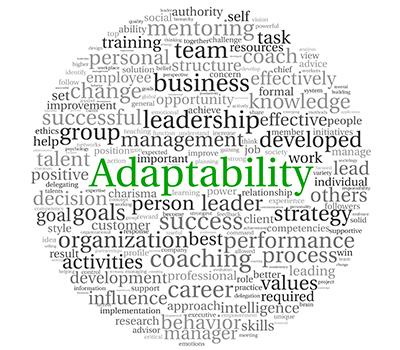During the COVID 19 pandemic, the need for a stable work environment, security and empathy has grown paramount in the workforce. In 2020, SHRM conducted a survey to measure employer response to the pandemic. They found that 67% of employers surveyed were discussing steps to transition to a work from home format and 42% of employers encouraged employees to work from home on a case by case basis (Zeidner, 2020).
The need for adaptive leadership and the role of Emotional Intelligence (EI)
According to research conducted by HR cloud, some of the key challenges include greater complexity, barriers to communication and collaboration, security concerns, lack of organizational resources, and a growing uncertainty about the future (HR Cloud, 2022).
There is a growing need for adaptive leadership in organizations around the world. Adaptive leadership allows leaders to create harmony in the team’s interpersonal relationships along with fulfilling the organizational goals and objectives. According to the Corporate Finance Institution, emotional intelligence (EI) is regarded as one of the key principles of adaptive leadership (CFI, 2022).
Furthermore, according to a research conducted by UCLA, Emotional Intelligence is responsible for the development of 93% of leadership qualities and 50% of individual performance (New Leaders Group, n.d.).
How does EI facilitate adaptive leadership in times of crisis?
Adaptive leadership cannot exist without emotional intelligence. EI is needed to manage effectively and form quality relationships. Leadership at the best of times is emotionally charged and under a situation of crisis, it is extremely difficult to access the cognitive state. A leader should be able to manage his emotions, be empathetic to others and prioritize building relationships in face of adverse circumstances.
An adaptive leader should be able to diffuse fear of failure during a crisis. He must understand the concerns and goals of his team, clients and even the organization. Emotional Intelligence enables adaptive leaders to build strong and healthy relationships with their subordinates. It facilitates the leader to increase influence within the company and be viewed as a mentor or a coach rather than an authoritative figure. This leads to increased performance, improved dialogue, and better decision making in times of crisis.
According to research conducted by McKinsey, company executives agree that interpersonal skills and facilitating teamwork are extremely important in leadership roles (Darino, Ogeah, & Srinivasan, 2018). Therefore, adaptive leadership is crucial for organizations and all adaptive leaders must possess high levels of emotional intelligence. Organizations around the world have understood the importance of emotional intelligence in cultivating adaptive leaders who are able to lead the company and foster a spirit of teamwork and excellence across all the employees in the organization.
How to adopt EI for an evolving future?
Emotional Intelligence can be learned through training and practice. Learning micro expressions will enable the leader to read fluctuations in emotional state of self and team members. These micro reflections are not apparently visible in verbal communication or gestures.
Communication and dialogue are key ways for leaders to practice emotional intelligence and hone their skills to respond to crisis situations within the company.
Emotional Intelligence is a necessary skill for operational effectiveness and business continuity and its role in the development of dynamic leaders in a company is not to be understated.
References
- Zeidner, R. (2020, March 21). Coronavirus Makes Work from Home the New Normal. Retrieved from SHRM: https://www.shrm.org/hr-today/news/all-things-work/pages/remote-work-has-become-the-new-normal.aspx
- HR Cloud. (2022, March 11). Challenges in the Modern Workplace in 2022. Retrieved from hrcloud: https://www.hrcloud.com/blog/challenges-in-the-modern-workplace-in-2022
- CFI. (2022, May 4). Adaptive Leadership. Retrieved from corporatefinanceinstitution: https://corporatefinanceinstitute.com/resources/careers/soft-skills/adaptive-leadership/
- New Leaders Group. (n.d.). Emotional Intelligence. Retrieved from newleaders: http://www.newleadersgroup.com/en/assessment/eq.html
- Darino, L., Ogeah, A., & Srinivasan, R. (2018, October 12). Developing tomorrow’s leaders in life sciences. Retrieved from mckinsey: https://www.mckinsey.com/industries/life-sciences/our-insights/developing-tomorrows-leaders-in-life-sciences




